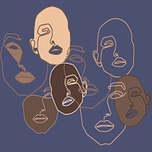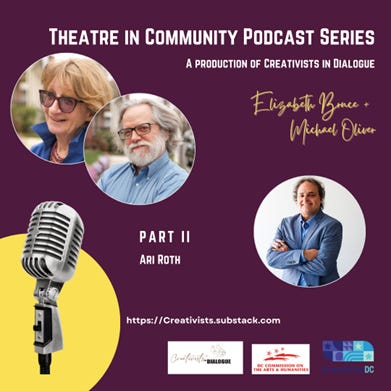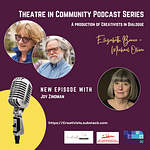This is Part 2 of our Theatre in Community interview with theater director, playwright, and producer Ari Roth. The former Artistic Director of Theatre J and the Founding Artistic Director of Mosaic Theater, Ari’s current theater leadership position is with the production company he now runs with A. Lorraine Robinson—Voices Festival Productions.
Ari Roth is the son of German-born refugees of the Holocaust. He was born and raised in Chicago, where he graduated from the University of Chicago Laboratory High School.
He studied playwriting at the University of Michigan. Based on his playwriting, he received two Avery Hopwood Awards for Drama, the first in 1981, given by Arthur Miller, a noted alum and playwright. Ari was the Artistic Director of Theater J at the Washington, DC Jewish Community Center from 1997 to 2014.
Over 18 seasons at Theatre J, he produced more than 129 productions and created festivals, including Locally Grown, Community-Supported Art, Voices from a Changing Middle East, and Theater J's acclaimed Beyond the Stage and Artistic Director’s Roundtable Series. In 2010, Roth was named one of the Forward 50, honoring nationally prominent men and women leading the American Jewish community into the 21st century.
Immediately following his departure from Theatre J, Ari founded the Mosaic Theater Company of D. C. in December 2014. And in 2017, he was given the D. C. Mayor's Arts Award for Visionary Leadership. From 2014 to 2020, he served as Mosaic’s Artistic Director.
Ari is married to Kate Schechter, the CEO and President of World Neighbors, and they have two daughters and one granddaughter.
For more information about Ari click here and here.
To help deepen your understanding of DC’s rich, recent theatrical history, we provide a glossary of terms and names with each conversation.
Glossary (in order of appearance)
Neil Simon's Lost in the Yonkers
Motti Lerner’s Pangs of the Messiah
Gassan Kanafani's Returned to Haifa
Citizens Opposed to Propaganda Masquerading as Art
Carol Churchill's Seven Jewish Children, a Play for Gaza
Jane Lange's Atlas Performing Arts Center
David Henry Wong's Yellow Face
Jackie Lawton's The Hampton Years
African Continuum Theatre Company
Bertolt Brecht's Fear and Misery in the Third Reich
We are eager to hear from our subscribers. If you like the conversation or have a comment or a question, use the comment feature or the heart button below. And thanks in advance for sharing this podcast with your friends and colleagues.
To those of you who are FREE subscribers, please consider becoming a PAID subscriber so that Creativists in Dialogue and its Theatre in Community Project can continue bringing you interesting and insightful conversations about creativity and theatre from DC and beyond.
Special shout out to Creativists in Dialogue’s Audio Engineer Elliot Lanes, our Social Media Manager Erinn Dumas of Dumas83, and our Transcription Editor Morgan Musselman.
For more information about Creativists in Dialogue or our other projects, please visit elizabethbruceDC.com or rmichaeloliver.com.
This project is supported by the DC Commission on the Arts and Humanities, HumanitiesDC, and by subscribers like you.








Share this post